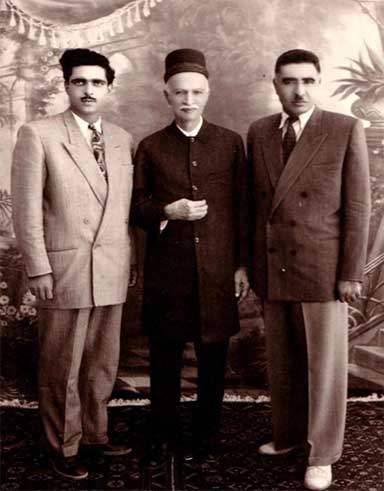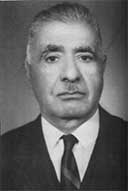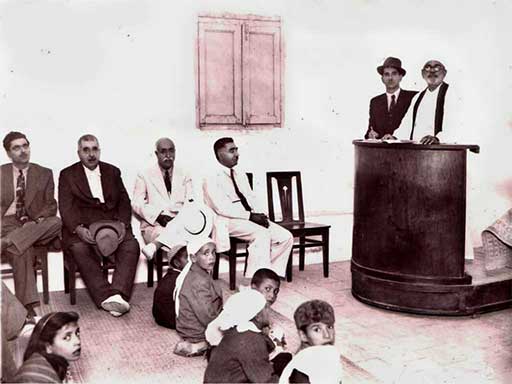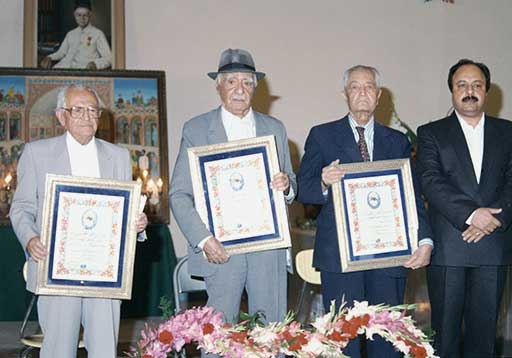|
|
“You give some when you
give of your earthly possessions, The
real giving is when you give of yourself.”
Every now and then a
community is blessed by with rare individuals of great vision, strong
sense of purpose and total devotion. They take upon themselves to serve
their community and country with full dedication while surmounting and
overcoming the roadblocks and challenges they encounter. It usually takes
awhile before the community at large comes to the realization of the
continuous sacrifices such individuals are making and appreciate their
great deeds. At that point the community turns to them and taps them for
more of the good they are able to spread. They are trusted into advisory
positions, or as trustee of foundations, and viewed as people to aspire
to. For the 20th century Zoroastrian community of the Yazd and
its surrounding villages, Mr. Soroush Lohrasb was such a personality.
 |
|
R-L: Mirza
Soroush Lohrasb, Peshotan Markar, Dr. Ra'ees Bahrami, 1949. Photo
courtesy of
www.oshihan.org |
Soroush was born into a
loving and caring family of seven in Jamshid Abad baug district of Tehran
in 1274 YZ (1906 C.E.). His father Tirandaz and his mother Gouhar were
both exemplary parents who gave their offspring all the love and devotion
they could muster, at the same as trusting them with family
responsibilities and encouraging them to excel at school.
Soroush completed his
primary school and proceeded to Alborz College in Tehran for completion of
his secondary education. Even at such a young age, Soroush recognizing the
acute needs of his community at a very critical conjecture in the history
of the community, made a conscious decision to forgo pursuing university
education and to offer his invaluable services to his community. This also
meant separation from his close friends including Dr. Jahanshah Saleh[2]
and Dr. Faridoon Varjavand[3]
who proceeded to the American University in Beirut for continuation of
higher education.
As it happened, it was
about this time that the Zoroastrian community leadership was searching
for a capable educator to manage the Dinyari school in Yazd, which was
without a principle since the retirement of its previous two headmasters
Mirza Sohrab Safrang and Mirza Kaikosrov Kiamanesh. On the recommendation
of Arbab Keikhosrow Sharokh[4]
(Zoroastrian Member of Iranian Parliament in Tehran), Soroush accepted to
serve as the temporary acting head of the school and moved from Tehran to
Yazd to undertake this responsibility. This was the first step that
launched him on his golden career as a community educator and a social
worker. Before long, he was confirmed into the permanent post of the
Headmaster for the Dinyarian School, thus the title of “Mirza Soroush”.
 |
|
Mirza
Soroush Lohrasb, 1965 |
Soon afterwards his
competence showcased to the community, he was
asked to undertake the task of overseeing the work of 14 Zoroastrian girls
schools that had been established in the city of Yazd and its surrounding
villages. Those schools were instrumental in giving the Zoroastrian youth
of Iran the lift they needed at that critical conjecture in history of
Zoroastrians of Iran, as the community was making a comeback.[5]
The establishment of the schools were made possible through the foresight
of the Late Manckji Limji Hatiaria who had come to Iran from India on a
golden mission of uplifting his coreligionists in Iran that had for so
long been suppressed by the Shiiat establishment and were teetering on the
verge of annihilation.[6]
It was mostly the Irannian Zoroastrian Community of Bombay that had
financed building of the14 schools.
With passage of each day,
Miza Soroush gained a deeper insight into the needs and ills of the
Zoroastrain community in Yazd and surrounding villages. In the meantime,
his enthusiasm, energy and hard work did not go unnoticed. He was a man
who could be trusted to get the job done, and had a thirst for community
work. These qualities brought him to the attention of the renowned Parsi
philanthropist, the Late Pashotanji Markar (Marker).[7]
Peshotanji Maker recognizing the desperate needs of the remaining
Zoroastrians of Iran – a recognition gained through his earlier travels to
Iran - established a number of charitable funds, and requested Mirza
Soroush not only to manage the funds, but also to spend the direct the
spending wherever he left was most needed. With the relative large funds
at his disposal, Mirza Soroush was in a position to turn some of his
dreams into reality. It was at this point that he decided to relinquish
the management of the Dinyari School, which was passed on to the Late
Mirza Shahriyar.
Directing Marker funds,
Mirza Soroush purchased a vast piece land in a desirable area of the city
of Yazd with a view to its future potential. Soon afterwards, the
construction of the Markar School was started in high gear. Mirza Soroush
was soon in a position to deliver high quality of education which he
aspired to, that could best meet the needs of the Zoroastrian community
and the nation. The quality of education delivered at Markar School became
legendary, and produced many high achiever professionals and technocrats
for Iran and throughout the world. If anything, Soroush showcased how
schoolwork can be made appealing and rewarding, and how the energy,
interest and enthusiasm of young generation can be funnelled to
constructive ends.
 |
|
Datur Kutar's Speech,
Yazd 1965. From R-L: Dastur Kutar, Mobed Rostam Shahzadi, Mirza
Soroush Lohrasb, Arbab Sohrab Kianian, Mobed Bahram Zartoshty, Dr.
Ra'ees Bahrami. |
Like any other society, the
Zoroastrian community Yazd had its share of financially disadvantaged
members and orphans. If anything, the acts of persecution and
discrimination prevalent during the preceding Qajar period had exasperated
the problem. To alleviate some of these difficulties facing the
Zoroastrian Community, Mirza Soroush decided to build a dormitories within
the Marker compound to house the disadvantaged children to bring about
some degree of equality of opportunity for all. He was also keen that the
pupils should learn and master a number of vocational
skills such as carpentry, mechanical tools, construction, etc.
Mirza Soroush visited
Bombay, India on numerous occasions. It was on one of the early visits
that he met Parvin, his partner in life. This happy marriage has resulted
in three daughters, Shahnaz, Shirin and Farkhondeh and a son Shahbahram.[8]
It was a caring and close knit family and Mirza Soroush enjoyed the
unequivocal support of his family at all times.
Mirza Soroush had no
interest in bureaucratic positions. Accumulation of wealth or status did
not entice him. Driving him was the desire to enhance his community, and
to serve its cause, and nothing would distract him from that goal. The
only non-educational assignment he undertook on a temporary basis, was
the managing director of the Darakhshan manufacturing operation in Yazd,
based on continuous requests he received from the Zoroastrians share
holders. Due to labour unrest, the previous management had fled the
factory and would not be allowed on premises by the protesting workers who
had taken over. The condition was getting out of hand, and none of the
owners felt safe to enter the premises. Finally Mirza Soroush, gave in to
the request of the owners, and one day ridding his bicycle, he entered the
factory premises and cycled towards the manager’s office that was
unoccupied. The protesting labourers not knowing what was transpiring
congregated on the manager’s office in threatening manner. Mirza Soroush
realizing the gravity of the moment comes out, and tells the angry crowd
he is not an owner, or a paid official, and that he will leave if the
workers’ mode and behaviour does not change. He goes on to say, that
stalemate is not helping anyone, and it is best to reach a compromise.
Through his calm and sincerity, Mirza Soroush was able to accomplish what
no previous intermediaries had been able to accomplish, namely to gain the
trust and confidence of the workers. Subsequently, the workers and the
management went back to successful negotiations, and with that successful
conclusion, Mirza Soroush was able to resume his other community work.
As a sign of gratitude for Pashotanji
Markar’s great acts of philanthropy in Iran that had enabled construction
of schools, orphanage, community facilities, Mirza Soroush decided to
build a clock tower on one of major throughways in Yazd on the road to
Kerman in memory of that great man,. To this day, the “Markar Clock
Tower” of Yazd stands. The Clock Tower is situated right outside
Markarabad, and Mirza Soroush had to negotiate with the Yazd municipality
to bring about the erection of the clock tower – not an easy undertaking
for a Zoroastrian individual at the time. However, given his charm,
charisma, strong personality, fame and the untold number of grateful
former students, the Yazd municipality had to relent. Today, this clock
tower stands at center of the Ferdowsi circle facing the Markarabad
leading to Kerman Avenue. Its on-going hourly chimes are a reminder of
great men, the late Pashotanji Markar and his most valued trustee, Mirza
Soroush Lohrasp. Both are revered names in the heart of the Zoroastrians
from Yazd.
 |
|
Receiving Lifetime Service Awards from
Tehran Zarathushti Anjoman: (L-R): Fereidoon Zartoshty, Mirza
Soroush Lohrasb, Ardeshir Jahanian, 1990. |
Soon, Mirza Soroush
recognized that, an increasing number of the Zoroastrian families were
migrating to Tehran in pursuit of greater opportunities and for their
children’s higher education. He was determined that those ex-patriots
Zartoshties from Yazd should have a reminder of Pashotanji Markar who had
come to their aid during very critical times. To achieve that goal, Mirza
Soroush sold some of the Markarabad land in Yazd, and used the proceeds
for the building of a Markar community complex in Tehran Pars (Eastern
suburb of Tehran). This multi-purpose community complex has been used by
the Zoroastrians of Tehran and its suburbs for community events and
religious functions.
Mirza Soroush passed away
at the age of 91. His record of accomplishments is exemplary given the
harsh conditions of the time. He was driven by a clear life long mission
of serving his community, and bettering his country and mankind to the
best of his ability. He stayed a humble and unassuming man throughout his
life and he never shied away from taking on challenges to improving the
education prospects of the lot. He was also a grateful man, on in the
goodness of his heart did what he was trusted with, and made sure the good
names of Pashotanji Markar and Manckji Limji Hatatia were remembered and
acknowledged. Thousands of the boys and girls whom he educated are serving
mankind throughout the world as medical doctors, engineers, lawyers,
professors, chief executives, deans and university faculties, etc. Words
can not express the dedication and the exceptional qualities of such an
extraordinary Zartoshty who devoted his life to the education of the young
and to the betterment of mankind. May his example inspire the rest of us.
[1]
This article was written in Farsi by Mr. Jamshid Pishdadi for
production on vohuman.org, and has been translated into English
courtesy of Dr. Sohrab Saadat of the UK. The posting of this article
on vohuman.org was completed on January 23, 2005. Some of the photos
and text appear in the Farsi language book, Memorial of Mirza
Soroush Lohrasb, authored by Jamshid Pishdadi, sponsored by Mobed
Mehraban Zartoshty, and printed in Southern California in 1999.
[2]
Dr. Jahanshah Saleh later became the minister of Health during the
reign of Mohamed Reza Shah Pahlavi and also served as dean of Tehran
University school of medicine
[3]
Dr. Faridoon Varjavand, a prominent Zoroastrian physician, established
one of the first modern maternity wards in Tehran. At that facility
many of the Capital’s younger generation of Zoroastrians as well as
others were born.
[4]
Keikhosrow Shahrokh
[5]
Manekji Limji Hateria
[6]
Seth Maneckji Limji
Hataria
[7]
Peshotanji Dossabhai
Marker
[8]
Mirza Soroush’s son Shahbahram obtained his BSc and Ph.D. degrees in
Engineering and has settled in Canada since the 1970s.
|